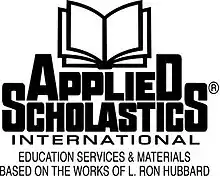Applied Scholastics International | |
 | |
 Location within Los Angeles | |
| Abbreviation | APS |
|---|---|
| Formation | 1972 |
| Founded at | Los Angeles, California |
| Type | Educational |
| Legal status | Non-profit |
| Purpose | Advancing the educational technology developed by L. Ron Hubbard[1] |
| Headquarters | 7065 Hollywood Blvd, Ste 200, Los Angeles, California |
| Coordinates | 34°06′06″N 118°20′38″W / 34.101723°N 118.343791°W |
Parent organization | Association for Better Living and Education[2][3] |
| Affiliations | Church of Scientology |
| Website | appliedscholastics |
Formerly called | Applied Scholastics Incorporated (1972–2000) |
| [1] | |
Applied Scholastics (APS) is a non-profit corporation founded in 1972 to promote the use of study techniques created by L. Ron Hubbard, the founder of Scientology. Hubbard called his theories on learning and education "study technology". Applied Scholastics runs the "Hollywood Education and Literacy Project" (HELP),[4] the World Literacy Crusade, "Education Alive", and the "Literacy, Education and Abilities Program" (LEAP).
Applied Scholastics is managed by the Church of Scientology[5][6] and was included in the 1993 closing agreement between the IRS and the Church of Scientology, and are classified as "Scientology-related entities".[7]
Study Tech
Study Tech is a teaching methodology developed by L. Ron Hubbard.
Hubbard's theories on education describe three "barriers to learning". The first is the absence of mass, pertaining to the lack of a physical object relating to a concept. The second is a steep study "gradient", meaning a necessary previous step was skipped to master a skill. The third is the "misunderstood word", which necessitates looking up unclear words in the dictionary.[8]
Students are taught that "misunderstood words" are a major cause of confusion and misunderstanding. They are taught to use dictionaries extensively. Emphasis is also put on making sure children are taught at a "gradient", so that a subject's crucial elementary concepts come before more difficult concepts. "Mass" is described as a measure of mental tangibility that students ascribe to a subject, so that students have a picture in their mind of the thing they are learning about.[9]
Applied Scholastics licenses Study Tech to a number of schools throughout the world. In return, these schools pay 4% of their gross income to Applied Scholastics.[10]
Criticism and controversy
In the 1980's Applied Scholastics, Inc., operating as a management consulting group and boasting a stable of high-tech clients, was the subject of a legal dispute between one of their clients, Applied Materials (AM), and three of AM's former employees. The former employees sued AM claiming they were driven out of the company after they complained about the Applied Scholastics training seminars and "refused to be trained under the doctrines of L. Ron Hubbard's Church of Scientology". Applied Scholastics was also named as a defendant in the suit. Employees at AM confirmed that "Scientology teachings were used regularly by the company during self-improvement and confidence seminars led by a company called Applied Scholastics". AM settled for an estimated $600,000 and admitted the company "lacked sensitivity with regard to the controversial nature of L. Ron Hubbard".[11][12]
In 1998, the group submitted five of its books for approval as supplemental classroom texts to the California Department of Education. The review board found no religious content to object to, although they did object to the lack of portrayals of disabled persons and people of color. The Southern California American Civil Liberties Union, however, objected on the basis that the books used many of the terms and concepts that the Church of Scientology uses elsewhere in its Study Tech.[13]
In the aftermath of Hurricane Katrina, Applied Scholastics convinced the principal of Prescott Middle School in Baton Rouge, Louisiana to implement a program of Study Tech.[9] Critics worried that the move was "an insidious plan ultimately aimed at promoting Scientology."[9] However, Prescott's principal and two education experts claimed that they "saw [no] hidden Scientology agenda or proselytizing in the text."[9] The school's principal felt that the program was worthwhile.[9] In October 2005, St. Louis Public Schools superintendent Creg Williams discovered the group's Scientology connections and immediately advised area principals to cease working with Applied Scholastics. Additionally, CEO Bennetta Slaughter falsely claimed a "partnership" with the Hazelwood School District in St. Louis.[14]
Some parents were upset when Applied Scholastics methods were introduced in September 2008 at Bambolino Montessori Academy, a private school in Toronto. The owner/principal and dean of the school are both Scientologists but they say that Applied Scholastics is secular and that they do not teach Scientology.[15]
The Georgia Board of Education had approved Applied Scholastics in 2006 for a three-year license to tutor under a federal program which pays to tutor students from public schools which don't meet minimum academic criteria. In 2009, four complaints were lodged against Applied Scholastic in Cobb County concerned about their connection with Scientology and about keeping religion out of education. Georgia education officials then began inspections to ensure Applied Scholastics' policies and teachings were geared toward secular instruction.[16]
In 2013, a group of charter schools in Phoenix, Arizona came under criticism for using tools provided by Applied Scholastics.[17]
See also
Notes
References
- 1 2 "Corporate documents". Secretary of State of California. Retrieved September 15, 2023.
- ↑ Mantesso, Sean (May 4, 2019). "Scientology's controversial push to enter schools with learning material — including in Australia". ABC News (Australia).
- ↑ Reitman, Janet (2011). Inside Scientology: The Story of America's Most Secretive Religion. Houghton Mifflin Harcourt. ISBN 9780618883028. OL 24881847M.
- ↑ Hollywood Education and Literacy Project Archived 2006-12-07 at the Wayback Machine
- ↑ Tighe, Mark (September 24, 2017). "Scientologists target schoolchildren". The Sunday Times. Archived from the original on September 13, 2023. Retrieved September 24, 2017.
- ↑ "Scientology's Education Fronts - Applied Scholastics International". studytech.org. 2007. Archived from the original on May 14, 2008.
- ↑ "Scientology Settles With IRS". The Wall Street Journal. December 30, 1997.
- ↑ Walsh, Mark. "Texts highlight scientology's role in education". Education Week. ISSN 0277-4232.
- 1 2 3 4 5 Farley, Robert (May 20, 2007). "Scientology makes it in classroom door". St. Petersburg Times. Archived from the original on September 19, 2008. Retrieved November 2, 2008.
- ↑ ABLE license contract for the use of Applied Scholastics trademarks (PDF format. Archived March 18, 2005)
- ↑ "Scientologizing". Forbes. September 14, 1992. p. 25.
- ↑ Goldman, James S. (March 30, 1992). "Lawsuit ties Applied Materials to Scientology teachings". The Business Journal. 5 (50).
- ↑ Szalanski, Andrea (Spring 1998). "'Clearing' Johnny to read". Free Inquiry. 18 (2): 12.
- ↑ Hinman, Kristen (October 26, 2005). "L Is for L. Ron - The state approves a tutoring program linked to Scientology, and everybody cries foul". Riverfront Times. Village Voice Media. Retrieved July 25, 2007.
- ↑ "Scientology link at Montessori school alarms parents". CBC News. September 18, 2009. Archived from the original on September 23, 2008. Retrieved September 19, 2008.
- ↑
- Mcwhirter, Cameron; Vogell, Heather (March 1, 2009). "Controversial church linked to tutors on state list". The Atlanta Journal-Constitution.
- "Ca. officials investigate tutoring firm's links to scientology church". Church & State. Vol. 62, no. 4. Americans United for Separation of Church and State. April 2009.
- ↑ O'Dowd, Peter (March 27, 2013). "Phoenix Schools Under Fire for Program Linked to Scientology". NPR.
Further reading
- Welkos, Robert W.; Sappell, Joel (June 27, 1990). "Church Seeks Influence in Schools, Business, Science". Los Angeles Times. Archived from the original on October 2, 2008. Retrieved October 4, 2007.
- Behar, Richard (May 6, 1991). "The Thriving Cult of Greed and Power". Time. Archived from the original on October 2, 2007. Retrieved October 4, 2007.
- Walsh, Jeff (March 1, 1998). "A broader look at the organization". Inside the Church of Scientology. Boston Herald.
- Mallia, Joseph (March 2, 1998). "Scientology Unmasked - Milton school shades ties to Scientology". Boston Herald.
- Di Matteo, Enzo (December 16, 1998). "Scientology wants city's kids - Controversial group tries to spruce up its image with its own brand of back-to-basics schooling". Now. Archived from the original on September 29, 2007. Retrieved July 25, 2007.
- Doward, Jamie (May 16, 2004). "Lure of the celebrity sect". Special reports. The Observer. Archived from the original on November 6, 2007. Retrieved October 4, 2007.
- Jacobs, Robin (September 1, 2004). "Is Scientology in Your Schools?" (PDF). The Humanist. Archived from the original (PDF) on February 29, 2008. Retrieved October 4, 2007.
- Hinman, Kristen (December 7, 2005). "Applied Pressure - Should St. Louis County grant tax breaks to Scientology-linked tutoring programs?". Riverfront Times. Village Voice Media. Retrieved October 4, 2007.
- Kleinhubbert, Guido (June 22, 2006). "Scientology in Germany: Suspicious Tutoring". Spiegel Online. Der Spiegel. Archived from the original on August 25, 2007. Retrieved October 4, 2007.
- Murphy, Kevin (December 15, 2006). "Odenwald Critical Of Campisi's 3 Absences". Webster-Kirkwood Times. Retrieved October 4, 2007.
- Didcock, Barry (February 17, 2007). "Hubbard Love". Sunday Herald. Archived from the original on August 30, 2008. Retrieved October 4, 2007.
- Stark, Holger; Rosenbach, Marcel (March 27, 2007). "Scientology's New European Offensive: The March of the 'Orgs'". Spiegel Online. Der Spiegel. Archived from the original on August 19, 2007. Retrieved October 4, 2007.
- Eighinger, Steve (June 2, 2007). "Quincy to be Literacy Center's main office". Quincy Herald Whig. Archived from the original on August 19, 2007. Retrieved October 4, 2007.
- Sedensky, Matt (August 11, 2007). "Scientologists find unlikely allies in other faiths". Florida Times-Union. Associated Press. Archived from the original on October 25, 2007. Retrieved October 4, 2007.
- Schultz, Frank (August 29, 2007). "School to use Hubbard theories". Janesville Gazette. Archived from the original on April 13, 2008. Retrieved October 4, 2007.
- Hilliard, Chloe (September 11, 2007). "Xenu Goes Uptown - Scientology Makes a Major Move into Harlem. But why?". Runnin' Scared. Village Voice. Archived from the original on September 15, 2007. Retrieved October 4, 2007.